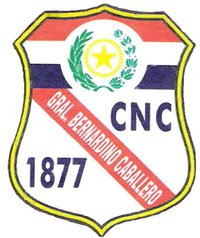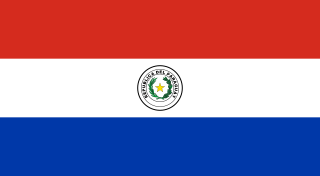
Marcos Antonio Morínigo Fleytas was a Paraguayan politician who served as President of Paraguay in 1894.

For the Paraguayan Minister of Education and Culture, see Luis Alberto Riart
Football is by far the most popular sport in Paraguay to the point that it is part of the nation's culture.

María Izquierdo was a Mexican painter. She was born María Cenobia Izquierdo Gutiérrez in San Juan de los Lagos in the state of Jalisco;. At the age of 5, she moved with her mother to Torreón after the death of her father. Her mother later married Dr. Nicanor Valdes Rodríguez, at which point Izquierdo was raised by her grandparents and relatives in small towns in Northern Mexico. Both her grandmother and aunt were devout Catholics and much of her upbringing revolved around daily Catholic traditions. At age fourteen she had an arranged marriage to a senior army officer, Colonel Cándido Posadas, and bore three children by the time she was 17 years old. In 1923, she and her family moved to Mexico City, where she first began to develop into a professional artist. She had a short-lived marriage, divorcing from her husband around 1928. Izquierdo has three children, two boys and a girl. It is said that her daughter has influenced some of Izquierdo's work, including "Niñas Durmiendo". Izquierdo and her family moved to Mexico City where she was able to go to school to study art. There she met her mentors Diego Rivera and Rufino Tamayo, who was also said to be her lover. Izquierdo had a second marriage, also short-lived, with Chilean painter Raul Uribe.

Clara Gonzalez (1898–1990) was the first Panamanian woman to earn her Bachelor of Law Degree in 1922. She created the National Feminist Party and pressed for suffrage for women by creating a school to teach them political responsibility. She was the first Latin American woman to earn a doctorate in law. She served in the Constitutional Assembly which finally granted women emancipation in 1946 and was the first Panamanian woman named as a Juvenile Court judge. She assisted in drafting the Juvenile Code and founded the Chapala Juvenile Reformatory.
Carlos Melendez Chaverri was a Costa Rican historian. Melendez was the son of Saturnino Lizano and Chaverri Orfilia Chacon. He married Maria Lourdes Doubles Umaña, who bore him five children: Silvia Maria, Lucia, Diego, Alberto and Pablo Melendez Doubles. He won the Magón National Prize for Culture in 1993.
María Luisa Garza Garza was a Mexican journalist and novelist, who wrote under the pen name "Loreley".
Maria Gonzalez may refer to:

Colegio Nacional de la Capital "Gral. Bernardino Caballero" is a public high school in Asuncion, Paraguay. The school is one of the most prestigious in Paraguay. Many personalities have studied there.

Women in Paraguay live in a culture that has been undergoing rapid change in recent decades. Women's rights were expanded through constitutional and legal changes during the 1990s. Cultural attitudes towards many areas of women's lives are also changing. Yet Paraguayan women still face many challenges in trying to attain social equality.

Derlis Alberto González Galeano is a Paraguayan professional footballer who plays for Brazilian club Santos on loan from Dynamo Kyiv and the Paraguay national team. Mainly a forward, he can play as a winger.

María de los Ángeles Errisúriz Alarcón is a Mexican writer, teacher and politician. She was Secretary of Education in Coahuila state. Co-author of 18 books to teachers and students about Intelligence Skills Development published in Spanish editorial "Trillas". Currently she is General Director of the Instituto Nacional para la Educación de los Adultos (INEA).
María Guadalupe González Talavera is a Paraguayan model and beauty pageant contestant who, after winning at the Nuestra Belleza Paraguay 2013 pageant, represented her country at the 62nd edition of Miss Universe pageant held in Moscow, Russia.

Amalia González Caballero de Castillo Ledón was a diplomat, cabinet minister, minister plenipotentiary, writer, president of the Supreme Court of Justice of the Nation, and the first female member of a presidential cabinet. After studying at the National Autonomous University of Mexico, she distinguished herself by fighting in favor of women. She was founder and chair of Club Internacional de Mujeres (1932) and the Ateneo Mexicano de Mujeres (1937). She also founded the Teatro de Masas. In the early 1940s, she was associated with the journal Hogar and in 1946-52, Castillo Ledón was a columnist for Excelsior. She worked for securing women's voting in 1952. Since 2012, her remains rest in the Rotonda de las Personas Ilustres.
Virginia Carlota Corvalán was a Paraguayan lawyer and feminist. She was born on 9 February 1900 in Asunción, Paraguay to Miguel Corvalán and Ana Casco. She studied at the National College, graduating in 1918, and was the only woman of the 40 graduates in that term. Between 1919 and 1921, she was actively campaigning for women's rights. She was a co-founder and participant in the Centro Feminista Paraguayo, which was pushing for passage of the draft law on equal rights between men and women, introduced by deputy Telémaco Silvera. The Center was the first feminist organization in Paraguay and included members such as Serafina Dávalos, Carmen Garcete, Carmen Gatti, Felicidad González, Adela Ibáñez, Ermelinda Ortiz, Sabrina Sapena Pastor, Catalina Steward, and Elida Ugarriza, among many others.
Elena Huerta Múzquiz was a Mexican artist best known for her mural work in her hometown of Saltillo, Coahuila, Mexico. Most of her art career was dedicated to teaching, but she was one of the founders of the Compañía de Teatro Infantil with German Cueto, Lola Cueto, Angelina Beloff and Leopoldo Méndez, the Liga de Escritores y Artistas Revolucionarios and a founding member of the Salón de la Plástica Mexicana. She created three mural projects in Saltillo, with the last done when she was 65 years of age, a work over 450m², the largest mural work created by a woman in Mexico.

Gumercinda Páez (1904-1991) was a teacher, women's rights activist and suffragette, and Constituent Assemblywoman of Panama. She was the first woman deputy to serve the National Assembly for the Panamá Province and was a vice president of the Constituent Assembly of Panama in 1946, being also the first woman to serve in that position. As a woman of mixed heritage, she was acutely aware of bias and strove for policies of inclusion.

Elina González Acha de Correa Morales was an Argentine educator, scientist and women's rights activist. In her early days, she was among the first graduates of the Argentine Normal School and was a painter, winning international recognition for both her textbooks and paintings. She was the driving force behind the founding of the Geographical Society of Argentina and served as its president from its establishment until her death. She and her husband, Argentina's first renowned sculptor, Lucio Correa Morales were defenders of the land claims of the Ona indigenous people.
María Libertad Gómez Garriga was a Puerto Rican educator, community leader, and politician. She is one of the twelve women honored with a plaque in "La Plaza en Honor a la Mujer Puertorriqueña", in San Juan.

Adela Speratti (1865–1902) and Celsa Speratti (1868–1938) were Paraguayan sisters who were instrumental in developing the educational system of the country. Born during the War Of The Triple Alliance, in which their father was killed, the sisters and their mother became refugees, fleeing to Argentina. Both trained as teachers there before returning to Paraguay and establishing the first normal school in Asunción.















